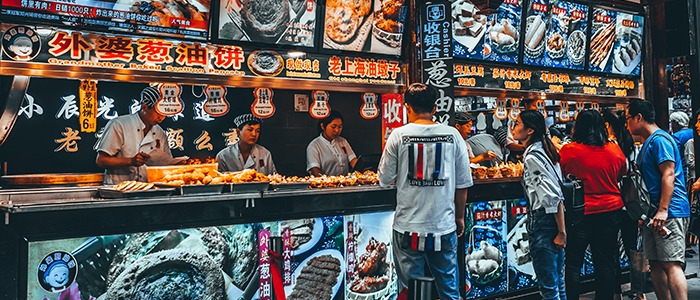An American Saying Thank You in Chinese
Thank you is the first word I learn in any new language. It’s kind of a collection I have for myself; without consulting any notes I can come up with how to say “thank you” in about thirty languages or so. To me, saying thank you is an absolutely indispensable part of daily life. Whether I’m traveling or in my home town, I probably say thank you a dozen times a day or more.
This, however, is a part of my culture. And in China, things are different in more ways than one.

Before I get to that, I’ll introduce several different words and phrases for thank you in Chinese that you can use around China. Check out my previous post on Chinese dialects for more on just how many types of Chinese there are.
Saying Thank You in Chinese
In Mandarin, the word is 谢谢 (xièxiè). I’ll save the exact pronunciation for another post (otherwise we’ll be here all day) but take some time to listen and repeat after a native recording if you can.
This simple two-syllable word will take you very, very far in Mandarin-speaking areas. A couple of less-common variants are 感谢 gǎnxiè and 多谢 duōxiè, though the latter is only really used in historical films.

How might you be more specific? Add the reason for the thanks at the end.
谢谢你的帮助 xièxiè nǐ de bāngzhù – Thanks for your help.
谢谢你请我吃饭 xièxiènǐ qǐng wǒ chīfàn – Thanks for treating me to a meal.
谢谢你带我参观这里 xièxiè nǐ dài wǒ cānguān zhèlǐ – Thank you for showing me around.
In areas where the local language is different from Mandarin, saying thank you in that variety will be a major bonus. Brace yourself for praise and surprised laughter from all sides!
In Cantonese, you can say dò zèh or m gòi (using Yale romanization). The first one is actually a Cantonese pronunciation of 多谢 (dò zèh), and the second is more of a “pure Cantonese” phrase. You should use dò zèh for expressing sincere thanks, for example if someone takes you out to dinner or gives you a present. M gòi is for the more everyday transactions. Lucky for you, Mandarin doesn’t distinguish these two different scenarios for saying thank you.
Chinese has as many varieties as China has cities, so you can ask around wherever you are to see what the local variety to say thank you is. If I was in Fuzhou, for instance, I’d say:
请问, 谢谢用福州话怎么说? (Qǐngwèn, xièxiè yòng fúzhōuhuà zěnme shuō?)
May I ask, how do you say “Thank you” in Fuzhou dialect?
A bit stilted in translation, perhaps, but the meaning is clear and you’ll soon be giving thanks left and right.

Mind Your Manners
But maybe more important than the words themselves is when you use them. For me, as I said, “thank you” is a frequent and automatic response to virtually anything done for my benefit. I’ll say thank you when I’m handed the menu at the restaurant, when it’s taken away, when the food is served, when the plate is removed, and when I pay. Other Americans reading this might be nodding their heads in agreement, but it’s entirely possible that non-Americans are frowning in disbelief.
In China, you simply don’t say thank you with such reckless abandon. A lot of transactions are completed with what seems like the bare minimum of words exchanged. I get teased all the time for 屁话多 (pìhuà duō) – flapping my lips, in other words.
So watch the people around you when you’re in a foreign place. See what the locals are doing, and (since you’re learning their language) try to understand what they’re saying and when they say it.
In a foreign country you’ll be given a lot of leeway to make cultural mistakes. But it’s the very subtle things that might make you seem rude. Another example from my own Chinese experience is that I tend to pause expectantly after asking something of a clerk or cashier. It turns out that my pause is a little bit too expectant in Chinese culture, and so it comes off as demanding unless I’m watching out for it. All these little things in addition to your language skills will really shape your experience in any foreign country.

Imagine you’ve texted a friend and told them you’ll meet up after lunch, but when you go there you miss the subway train and arrive ten minutes late. It might be a natural response to say “Thanks for waiting for me!” and this wouldn’t necessarily be wrong in Chinese – but it’s not really what’s often said. Instead you say something in the vein of 不好意思,让你久等 (bùhǎoyìsi, ràng nǐ jiǔ děng). This translates to “Sorry for making you wait” or “Sorry for keeping you waiting!”
In Chinese restaurants, I still feel a little bit weird not constantly saying thank you. I usually get by with just a single 谢谢 (xièxiè) as I get my change. But it’s not as strange as it once was to walk in and have my meal without saying anything more than the name of the dish. And though it might seem rude to Americans, the server isn’t there to make conversation either. Especially in the smaller establishments that are ubiquitous in China’s larger cities. It’s very common for the server to just drop off a sheet of paper with the menu for you to write your own order down. Better practice your handwriting!

If you’re not in a Chinese immersion environment yet, how can you prepare yourself for these subtle social cues? Being aware of them is really the first step – for the restaurant example, think of it as different cultural expectations instead of rude waitstaff. You can also try watching some of the sitcoms or dramas produced all over China. There’s an enormous selection on YouTube posted on the channels of the provincial TV stations. Watch these for language practice of course, but also pay attention to how and when people greet each other, take leave, and of course – express their thanks.
Check out LingQ today to discover how to learn Chinese from content you love!
***
Alex Thomas started seriously studying languages five years ago and will never stop. He has lived in several cities in China and cannot wait to return.
